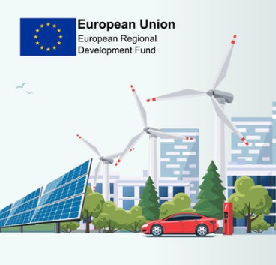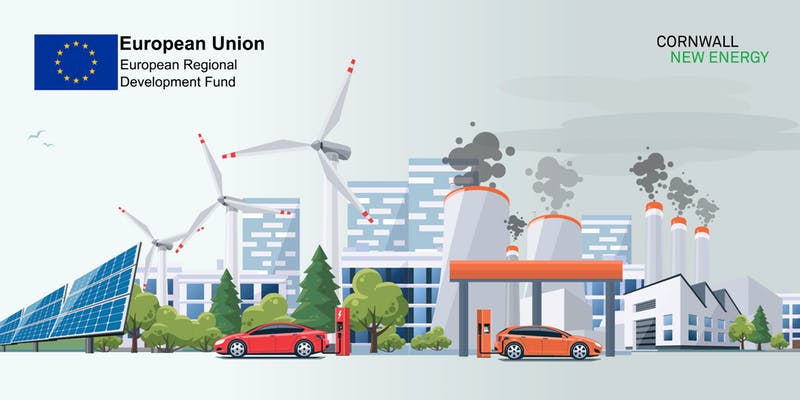
Energy solutions showcased at Cornwall New Energy Fair next month
Home News and events News Energy solutions showcased at Cornwall New Energy Fair next month

Climate breakdown and ecological emergency is now discussed more urgently and more frequently since the IPCC report released last year stated that in order to limit global temperature rise to 1.5 degrees, action must be taken across all sectors. With less than 12 years to take action, ambassadors such as Sir David Attenborough and Leonardo DiCaprio have raised awareness tenfold and direct action from Greta Thunberg, Youth Strike 4 Climate and Extinction Rebellion has motivated UK councils and governments in England, Scotland and Wales to declare a state of climate emergency.
Cornwall Council recently released an action plan which outlines aims for the county to reach carbon neutrality by 2030. The plan will drive forward ambitious targets and sets out commitments for Cornwall Council to make necessary changes that prioritise climate emergency measures in key decision-making processes within the public sector.
The report also acknowledges that ‘combating climate change needs system-wide change that involves communities, business, individuals and stakeholders across all sectors of the economy’.
So how can your business lead the way in reaching these goals for Cornwall?
Cornwall New Energy (CNE) technical delivery manager, Amanda Forman, explains: “Making small changes across many businesses can have an immediate impact on reducing energy consumption and consequently greenhouse gas emissions. Changing working patterns to consider how energy is used and consumed on site sets forward the motion of change which encourages the sustainability agenda to grow and bigger commitments to be obtained next year.”
“As a project, CNE has offered an excellent opportunity to assess the need for multi vector energy systems, which means looking at all the options for reduction and generation of renewable and low carbon energy across Cornwall and the Isles of Scilly.”
“However, there is not one solution that fits all,” adds Amanda, “rather a selection of solutions that must be applied and specified correctly, driven by suitability not subsidy. Electrification of the heat network is widely discussed; to achieve this, the national grid will require massive infrastructure upgrade. Multi vector solutions will mean consideration of methods to utilise the existing gas network to provide a low carbon gas supply network. It is also imperative to find solutions for off-gas areas and ensure that fuel poverty is addressed by creating affordable and accessible energy options.”
The CNE Project began in 2017 with the aim of supporting small and medium sized Cornish businesses in the move to adopt low carbon technologies and invest in renewable energy. The aim of the project is to help develop innovation, set up research collaborations and provide business support through making recommendations on suitable investments.
Led by PRP Architects LLP, the project is able to influence building design and integrate climate mitigation and efficiency measures into architectural design.
Building fabric performance, minimising heat loss, and creating positive air flows for building health all contribute to low carbon buildings and need to be considered at an early stage to ensure their success. PRP is currently taking a leading role in sustainable design within some of Cornwall’s major developments, including the master plan for Truro’s redevelopment of Pydar Street.
On October 2, CNE will showcase some of its work at the Annual Conference and Trade Fair 2019 at St Austell Conference Centre. There will be seminars to attend on solar PV for business, affordable low carbon buildings, and renewable energy systems.
The conference will run informative sessions showcasing work from Community Energy Plus, BRE, University of Exeter, and Community Works.
PRP, the lead contractor for the project, has considered some top tips for businesses to reduce their carbon footprint in ten easy steps which will be available on the day.
These tips include effective and simple carbon and financial savings such as how to:
- Monitor electricity consumption to run the business more efficiently – understanding how electricity and gas is used and consumed within a business can save up to 20% of energy spend.
- Switch lighting to LED. Calculations show the energy savings can produce a payback on investment of less than 2 years*
- Use solar PV if a suitable space is available to offset daytime electricity costs.Solar generates electricity most effectively in the summer, during the day when most businesses are fully operational. When all the electricity is used on site the savings are clearly seen through reduced bills.
- Reduce commuter fuel by driving less. Skype and video conferencing can be an effective replacement.
One of the main problems the project has found with delivery of solutions is access to capital. Many small businesses have the intention to make sustainable investments but when it comes to changing their infrastructure, the costs associated with it can become financially difficult to deliver. The technical feasibility of any project needs to be carefully delivered as multiple options can be confusing.
CNE delivery manager, Alex Nicholas, explains: “Some businesses may wish to go further with a recognisable investment for energy reduction, for example ground source heating can be an excellent and efficient way to move away from oil and gas based systems and is very well suited to new build and retrofit building projects, but it requires a commitment to building efficiency and significant upfront investment. For this type of investment there are still subsidies available through the Renewable Heat Incentive (RHI).”
Other recommendations made by CNE are more affordable and easier to obtain significant results, these include energy monitoring, switching to LED lighting and changing patterns of behaviour in the workplace. These actions can be adopted very early on in any business model and really only take a basic level of commitment and understanding of the issue.
Alex says CNE aims to deliver a programme of work which can cover small businesses and start-ups which don’t have access to capital, as well as the more established enterprises that do.
The recommendations and support available through CNE focus on providing a range of solutions, including access to events and seminars to provide objective advice and guidance on how technologies work and the suitability to specific situations.
The CNE Annual Conference and Trade Fair in October will welcome Steve Jermy as the key note speaker on the importance of adopting low carbon strategy within a business, and access to bespoke consultancy through all of the project partners.
The CNE project draws to a close in November this year, up until then you can access the project by emailing a.forman@prp-co.uk
Book your place to the Cornwall New Energy Conference here.
